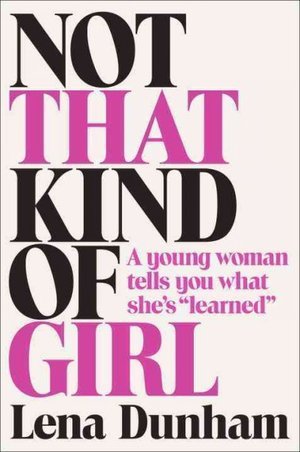Lena Dunham’s self-portrait
Not That Kind of Girl: A Young Woman Tells You What She’s “Learned” by Lena Dunham. Random House, 265 pp.
I didn’t expect to enjoy Not That Kind of Girl as much as I did. But Lena Dunham happens to be a terrific writer—funny and surprising, with lots of rhetorical moves.
On the one hand, this is very much a New York trade book: the high concept packaging includes a canny title and cute line drawings; its prose is snappy and dry-eyed for all its introspection; and it is fittingly dedicated to the late Nora Ephron. On the other, Dunham’s turn at one point to second-person point of view and her regular inclusion of segmented essays—numbered lists with neat juxtapositions—bespeaks a writer who imbibed a high creative nonfiction aesthetic in the groves of academe. Not That Kind of Girl exudes a neat hybrid synergy. Kind of like Dunham herself, with her Jewish mother and Protestant father.
Dunham portrays herself as a mess growing up and coming of age, so full of excess emotion and so plagued by phobias that you’re regularly appalled—and steadily entertained. And surprised by her meteoric rise as an actress-director-producer-writer. Except she was graced with enviably tolerant, indulgent, and long-suffering artist parents. She’s a perfect storm of nature and nurture. Her parents raised their difficult, obsessive-compulsive daughter with love, and it shows.
They also got her professional help. Repeatedly. I imagine she’ll get lots of hate for her self-involvement or for being such a neurotic New Yorker, but I admire her inquiry into herself and her emotional honesty. I like to imagine she’s a good friend. I do wonder if it’s still exhausting to be her. At least she seems to channel her energy productively into art. She’s amused by her younger self, who is a gold mine for the writer: mordant, interestingly flawed, creative, and hyper aware.
Here she is on school-days dating:
No guys like me at school. Some ignore me while others are outright cruel, but none want to kiss me. I’m still distraught over a seventh-grade breakup and refuse to attend parties I know my ex will be at. At this point, my heartbreak has lasted twenty-four times as long as our relationship.
Dunham admits to being obsessed by her mother, but mom’s a shadowy figure in the book—her sketches of her easygoing father, however, make him real, and you wouldn’t mind more dad. Her account of therapist-shopping with him is one of the book’s funniest parts.
[Dunham: awkward sex, volatile friendships, surges of hope & despair.]
These memoir essays are grouped into five categories: Love & Sex, Body, Friendship, Work, Big Picture. They blended together on first reading. Including her complete diet in one essay seemed a mistake. Her “worst email ever,” with footnotes, didn’t quite work for me, either. But then, I imagine her core audience is female and younger. I’m old enough to be her father. Yet Not That Kind of Girl offers lessons for anyone writing about himself. (How does her voice work?) And Dunham’s frankness and pleasing turns of phrase are consistently rewarding.Here she is upon returning to her college to give a lecture:
I’ve always had a talent for recognizing when I am in a moment worth being nostalgic for. When I was little, my mother would come home from a party, her hair cool from the wind, her perfume almost gone, and her lips a faded red, and she would coo at me: “You’re still awake! Hiiii.” And I’d think how beautiful she was and how I always wanted to remember her stepping out of the elevator in her pea-green wool coat, thirty-nine years old, just like that. Sixteen, lying on the dock at night with my camp boyfriend, taking tiny sips from a bottle of vodka. But school was so essentially repulsive to me, so characterized by a desire to be done. That’s part of why it hurts so bad to see it again.
I read Not That Kind of Girl because I’m using it in a “Writing Life Stories” college class I’m teaching this spring, and if the students like it I’ll certainly read it again because I’ll teach it again. There’s no predicting their response. Only in this case I’m pretty sure they’ll keep reading even if they hate Dunham. She captures the awkward sex, volatile friendships, and surges of hope and despair familiar to most twenty-somethings. They’ll enjoy the flashes of vulgarity, which arise from sexual escapades, mostly, and which Dunham doesn’t wallow in.
I’m not very familiar with Dunham’s film work, but gather that her telegenic appeal is that she’s “real.” This seems code for being considered unattractive in body, by filmic standards, and troublesome in soul but blithely undeterred. However you look at it, this book proves she’s got talent to burn.
Not That Kind of Girl brims with the deceptively easy prose of a smart, serious, and almost-always-entertaining literary artist.


![[Dunham: awkward sex, volatile friendships, surges of hope & despair.]](https://i.gr-assets.com/images/S/compressed.photo.goodreads.com/hostedimages/1415458710i/11792864.jpg)


